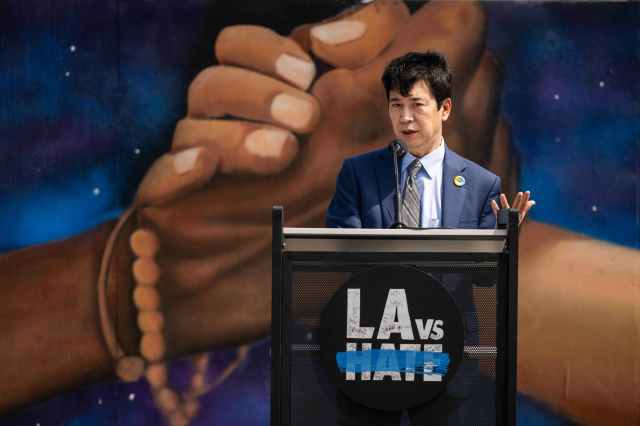Surge in Bias-Motivated Incidents Reveals Troubling Racial and Religious Tensions
Religion
2025-04-04 01:14:35Content

A disturbing surge in hate incidents has been documented in 2023, with reports revealing a significant increase in discriminatory actions across the country. The latest data shows a stark rise from 609 reported incidents in 2022 to a troubling 821 incidents in 2023 - a clear indication of growing social tensions and prejudice.
Most alarmingly, racial, ethnic, and national origin-based discrimination continues to be the primary driver of these hate incidents, accounting for approximately 50% of all reported cases. This statistic underscores the ongoing challenges of systemic bias and the urgent need for community education and intervention.
The escalating numbers serve as a critical reminder that combating hate and promoting understanding remain essential priorities for building a more inclusive and respectful society.
Rising Tide of Intolerance: Unmasking the Surge in Hate Incidents Across America
In an era of increasing social tension and polarization, the landscape of interpersonal conflict has taken a disturbing turn. The dramatic escalation of hate-related incidents reveals a complex tapestry of social challenges that demand urgent attention and comprehensive understanding.Confronting the Uncomfortable Truth: A Nation Grappling with Prejudice
The Alarming Statistical Trajectory
The year 2023 marked a significant watershed in the documentation of hate-related occurrences, presenting a stark and troubling narrative of social discord. Comparative data reveals a substantial 35% surge in reported incidents, escalating from 609 in 2022 to a staggering 821 in 2023. This exponential increase is not merely a statistical anomaly but a profound reflection of deeper societal fractures. Researchers and social scientists have been meticulously analyzing these numbers, uncovering nuanced patterns that extend beyond simple numerical representation. The data suggests a multifaceted phenomenon rooted in complex socio-cultural dynamics, where systemic tensions manifest through individual interactions.Racial Motivations: Unpacking the Core Drivers
Perhaps the most revealing aspect of these incidents is their fundamental motivation. An overwhelming 50% of reported events were explicitly driven by racial, ethnic, or national origin considerations. This statistic illuminates the persistent undercurrents of systemic racism and xenophobia that continue to plague contemporary society. The geographical distribution of these incidents reveals intricate regional variations, suggesting that prejudice is not uniformly experienced but instead reflects localized social ecosystems. Urban centers, suburban landscapes, and rural communities each present unique manifestations of these tensions.Psychological and Social Implications
Beyond raw numbers, these incidents represent profound human experiences of marginalization, fear, and systemic exclusion. Each reported event carries emotional weight, representing not just a statistical data point but a lived traumatic experience for individuals and communities. Mental health professionals emphasize the long-term psychological impact of such experiences, noting that repeated exposure to discriminatory behavior can lead to chronic stress, reduced social cohesion, and diminished community resilience. The ripple effects extend far beyond immediate interactions, potentially reshaping entire social narratives.Institutional and Community Responses
Addressing this escalating challenge requires a multifaceted approach involving legal frameworks, educational initiatives, and community-driven dialogue. Institutions are increasingly recognizing the need for proactive strategies that go beyond reactive measures. Community organizations, educational platforms, and grassroots movements are developing innovative intervention models. These approaches focus not just on documenting incidents but on fostering understanding, promoting empathy, and creating spaces for meaningful intercultural dialogue.Technological Dimensions of Hate Tracking
Advanced data collection and analysis technologies are revolutionizing how hate incidents are monitored and understood. Machine learning algorithms and sophisticated tracking systems provide unprecedented insights into the nuanced patterns of discriminatory behavior. These technological tools enable more precise identification of emerging trends, helping policymakers and community leaders develop targeted intervention strategies. The intersection of technology and social research offers promising avenues for comprehensive understanding and potential mitigation.Looking Forward: A Call for Collective Action
The rising tide of hate incidents is not an insurmountable challenge but a critical opportunity for societal transformation. It demands collective introspection, empathy, and a commitment to dismantling systemic barriers that perpetuate division. By fostering open dialogue, promoting education, and creating inclusive spaces, communities can work towards healing and understanding. The path forward requires courage, compassion, and an unwavering commitment to recognizing our shared humanity.RELATED NEWS
Religion

EPA's Climate Crackdown: How New Regulations Could Derail California's Green Ambitions
2025-03-13 21:24:00
Religion

Faith and Controversy: Edcouch-Elsa ISD's Curriculum Sparks Heated Debate
2025-05-02 22:40:00






